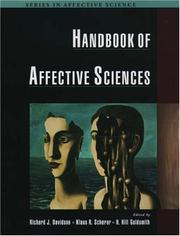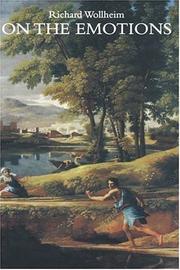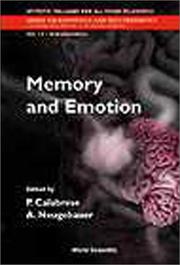| Listing 1 - 10 of 394 | << page >> |
Sort by
|
Multi
ISSN: 2352099X ISBN: 9789027241597 9027241597 9027269815 9789027269812 Year: 2014 Volume: 9 Publisher: Amsterdam Philadelphia
Abstract | Keywords | Export | Availability | Bookmark
 Loading...
Loading...Choose an application
- Reference Manager
- EndNote
- RefWorks (Direct export to RefWorks)
True Emotions discusses several key problems in emotion research. The question about the true nature of emotions focuses on the role of cognition in human emotions at different levels of analysis: functional role, types of processes and representations, and neural implementation. Truth to the self, or authenticity, has two meanings, psychological and normative, where the latter is analyzed as coherence between the evaluative content of an emotion and the subject's internally justified beliefs and values. Truth to the world is argued to be a matter of correct evaluative representation of the em
Emotions --- Emotions. --- Feelings --- Human emotions --- Passions --- Psychology --- Affect (Psychology) --- Affective neuroscience --- Apathy --- Pathognomy

ISBN: 1280830972 0198029128 0195302052 9780198029120 9780195126013 0195126017 9780195302059 9781280830976 9786610830978 6610830975 0197735592 Year: 2003 Publisher: Oxford New York Oxford University Press
Abstract | Keywords | Export | Availability | Bookmark
 Loading...
Loading...Choose an application
- Reference Manager
- EndNote
- RefWorks (Direct export to RefWorks)
A road-map to the burgeoning area of affective sciences, this text brings together the strands of inquiry and latest research in the scientific study of the relationship between the mechanisms of the brain and the psychology of mind.
Affect (Psychology) --- Emotions. --- Feelings --- Human emotions --- Passions --- Psychology --- Affective neuroscience --- Apathy --- Pathognomy --- Emotions

ISBN: 0585366799 9780585366791 0300079745 Year: 1999 Volume: 1991 Publisher: New Haven, CT : Yale University Press,
Abstract | Keywords | Export | Availability | Bookmark
 Loading...
Loading...Choose an application
- Reference Manager
- EndNote
- RefWorks (Direct export to RefWorks)
"Richard Wollheim recruits into service the insights of literature and of psychoanalysis, as well as of philosophy, in this thought-provoking account of the emotions. Starting from the premise that emotions form a distinct psychological category, Wollheim argues that they are - like beliefs and desiresdispositions or underlying forces in the mind that erupt from time to time into the stream of consciousness. However, to assimilate emotions to beliefs or to desires or to some combination of the two is quite wrong. Emotions are attitudes or orientations to the world, says the author, and in this regard they are naturally associated with the imagination."--Jacket.
Emotions. --- Emotions --- Social Sciences --- Psychology --- Feelings --- Human emotions --- Passions --- Affect (Psychology) --- Affective neuroscience --- Apathy --- Pathognomy
Book
ISBN: 1317034333 1317034325 1283705826 1409453189 9781409453185 9781409453178 1409453170 9781315616001 9781317034315 9781317034322 9781138273115 1315616009 Year: 2013 Publisher: Burlington, VT Ashgate
Abstract | Keywords | Export | Availability | Bookmark
 Loading...
Loading...Choose an application
- Reference Manager
- EndNote
- RefWorks (Direct export to RefWorks)
Amidst prevailing debates that construe rationality and emotionality as polar opposites, this book explores the manner in which emotions shape not only prevailing conceptions of rationality, but also culture in general terms, making room for us to speak of an 'emotional culture' specific to late-modern societies. Presenting case studies involving cultural artefacts, narratives found in fictional and non-fictional literature and television programs, speech patterns and self-talk, fashion, and social networking practices, The Emotions and Cultural Analysis sheds light on the relationship between
Emotions. --- Emotions --- Feelings --- Human emotions --- Passions --- Psychology --- Affect (Psychology) --- Affective neuroscience --- Apathy --- Pathognomy
Book
ISBN: 1443850144 9781443850148 Year: 2013 Publisher: Newcastle upon Tyne Cambridge Scholars Publishing
Abstract | Keywords | Export | Availability | Bookmark
 Loading...
Loading...Choose an application
- Reference Manager
- EndNote
- RefWorks (Direct export to RefWorks)
Resentment. --- Emotions. --- Feelings --- Human emotions --- Passions --- Psychology --- Affect (Psychology) --- Affective neuroscience --- Apathy --- Pathognomy --- Emotions
Book
ISBN: 1280769238 9786613680006 9027274754 9789027274755 9781280769238 9789027241573 9027241570 6613680001 Year: 2012 Publisher: Amsterdam Philadelphia John Benjamins Pub. Co.
Abstract | Keywords | Export | Availability | Bookmark
 Loading...
Loading...Choose an application
- Reference Manager
- EndNote
- RefWorks (Direct export to RefWorks)
One of the most important theoretical and empirical issues in the scholarly study of emotion is whether there is a correct list of "basic" types of affect or whether all affective states are better modeled as a combination of locations on shared underlying dimensions. Many thinkers have written on this topic, yet the views of two scientists in particular are dominant. The first is Jaak Panksepp, the father of Affective Neuroscience. Panksepp conceptualizes affect as a set of distinct categories. The leading proponent of the dimensional approach in scientific psychology is James Russell. Accord
Affect (Psychology) --- Emotions. --- Feelings --- Human emotions --- Passions --- Psychology --- Affective neuroscience --- Apathy --- Pathognomy --- Emotions

ISBN: 1281929212 9786611929213 9812776567 9789812776563 9812381708 9789812381705 9781281929211 6611929215 Year: 2002 Publisher: Singapore River Edge, N.J. World Scientific
Abstract | Keywords | Export | Availability | Bookmark
 Loading...
Loading...Choose an application
- Reference Manager
- EndNote
- RefWorks (Direct export to RefWorks)
This book deals primarily with the role of emotions in the mechanisms of memory. It is a compilation of the lectures given at a course conducted at the International School of Biocybernetics.
Memory --- Emotions --- Feelings --- Human emotions --- Passions --- Psychology --- Affect (Psychology) --- Affective neuroscience --- Apathy --- Pathognomy --- Physiological aspects
Book
ISBN: 9781138248489 9781317144007 1317144007 9781315579443 1315579448 9781317143994 131714399X 9781317144014 1317144015 1472437772 9780754670247 1138248487 9781472437778 Year: 2016 Publisher: London Routledge
Abstract | Keywords | Export | Availability | Bookmark
 Loading...
Loading...Choose an application
- Reference Manager
- EndNote
- RefWorks (Direct export to RefWorks)
In Encountering Affect, Ben Anderson explores why understanding affect matters and offers one account of affective life that hones in the different ways in which affects are ordered. Intervening in debates around non-representational theories, he argues that affective life is always-already 'mediated' - the never finished product of apparatuses, encounters and conditions. Through a wide range of examples including dread-debility-dependency in torture, ordinary hopes, and precariousness, Anderson shows the significance of affect for understanding life today.
Affect (Psychology) --- Emotions. --- Feelings --- Human emotions --- Passions --- Psychology --- Affective neuroscience --- Apathy --- Pathognomy --- Emotions
Book
ISBN: 073912966X 1461632889 9781461632887 Year: 2009 Publisher: Lanham Lexington Books
Abstract | Keywords | Export | Availability | Bookmark
 Loading...
Loading...Choose an application
- Reference Manager
- EndNote
- RefWorks (Direct export to RefWorks)
A Theory of Feelings examines the problem of human feelings, widely understood, from phenomenological, analytical, and historical perspectives. It begins with an analysis of drives and affects, and pursues the nature of 'feeling' itself, in all of its variability, through a close study of the distinctive categories of the emotions, emotional dispositions, orientive feelings, and the pasions. The book will be of interest to anyone interested in philosophy, psychology, sociology, and cognitive science.
Emotions. --- Feelings --- Human emotions --- Passions --- Psychology --- Affect (Psychology) --- Affective neuroscience --- Apathy --- Pathognomy
Book
ISBN: 0191040487 0198744641 0191017493 9780191017490 9780199668335 0199668337 Year: 2015 Publisher: New York, New York : Oxford University Press,
Abstract | Keywords | Export | Availability | Bookmark
 Loading...
Loading...Choose an application
- Reference Manager
- EndNote
- RefWorks (Direct export to RefWorks)
The history of emotions is one of the fastest growing fields in current historical debate, and this is the first book-length introduction to the field, synthesizing the current research, and offering direction for future study. The History of Emotions is organized around the debate between social constructivist and universalist theories of emotion that has shaped most emotions research in a variety of disciplines for more than a hundred years: socialconstructivists believe that emotions are largely learned and subject to historical change, while universalists insist on the timelessness and pan
Emotions --- Emotions (Philosophy) --- Philosophy --- Feelings --- Human emotions --- Passions --- Psychology --- Affect (Psychology) --- Affective neuroscience --- Apathy --- Pathognomy --- History.
| Listing 1 - 10 of 394 | << page >> |
Sort by
|

 Search
Search Feedback
Feedback About UniCat
About UniCat  Help
Help News
News